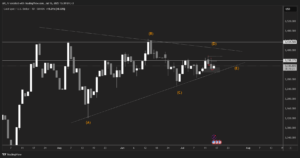Eurozone inflation is expected to cool to 10.4% YoY and guide expectations for the December ECB meeting. Is 50 the new 75?
· Chinese PMIs show economic activity contracted by more than expected
· Eurozone inflation eases after Germany and Spain’s inflation cools
· Gold rises ahead of Federal Reserve Chair Jerome Powell’s speech
Stocks on Wall Street closed in the red on Tuesday, weighed partly by falling consumer confidence and as investors continued to digest developments in China.
COVID protests continue in parts of China amid ongoing frustration and anger toward the strict and unsustainable zero- COVID policy. However, an announcement by Beijing that they will vaccinate senior citizens is a crucial step towards reopening.
The impact of COVID curbs on the economy was clear in Chinese PMI data. China’s economic activity contracted more than expected in November as COVID measures continued to hurt growth and worsened confidence. The official manufacturing PMI fell to 48 in November, below the 49-level forecast and well below October’s 49.2.
The non-manufacturing sector experienced an even larger contraction, with the PMI falling to 46.7 in November, down from 48.7 last month.
The market has broadly brushed off the weak data, with the yuan rising 0.2% and AUD/USD rising 0.1% on China reopening bets.
AUD/USD is pushing higher despite Australian inflation cooling to 6.9%, down from 7.3%. The data supports the RBA’s decision to slow the pace of rate hikes to 25 basis points.
Eurozone inflation
Inflation will remain in focus in the European session with the release of eurozone inflation data which could provide clues as to whether the ECB will hike interest rates by 50 basis points or 75 in the December meeting. Recent ECB speakers have been divided between slowing the pace of rate hikes to 50 or continuing with its more aggressive approach of 75 basis points.
Expectations are for inflation to ease slightly in November to 10.4% YoY, down from 10.6% in October. The data comes amid signs within the bloc that inflation could be cooling. German inflation eased slightly from a record high of 11.6% to 11.3%, and German PPI also fell steeply to 34.5% from 45%. Spanish inflation has also unexpectedly dropped to 6.6% from 7.3%.
The data could be early signs that inflation in the eurozone is peaking. However, this would be in contrast to comments from ECB President Christine Lagarde, who said on Monday that inflation in the region could still rise further.
EUR/USD trades 0.2% higher at 1.0350 at the time of writing. Cooler inflation could pull the EUR lower.
Powell speech
Looking ahead to the US session, a speech by Federal Reserve Chair Jerome Powell will be the main focus. The markets will watch closely for any signs of a less hawkish Jerome Powell. Currently, the market is pricing in a 67.5% likelihood of a 50 basis point hike in December. While inflation is cooling, it is still around four times the Fed’s target level. Furthermore, Fed speakers this week have had a hawkish bias, so Powell could still stick to the hawkish hymn sheet.
Gold is rising ahead of the speech and is set to book its strongest monthly gain in 2.5 years as the USD experiences its weakest month in a decade. A less hawkish Powell could boost gold further toward $1800.
US Q3 GDP data and ADP Payroll figures are also due to be released today.
Disclaimer: This article is not investment advice or an investment recommendation and should not be considered as such. The information above is not an invitation to trade and it does not guarantee or predict future performance. The investor is solely responsible for the risk of their decisions. The analysis and commentary presented do not include any consideration of your personal investment objectives, financial circumstances, or needs.
Sources: Bloomberg, CNBC, Reuters
Original article provided by Trading Writers





